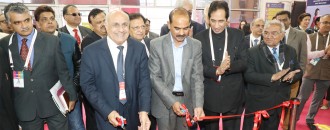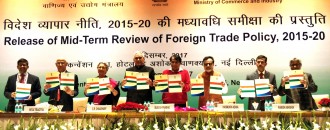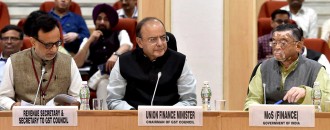
Apparel industry is going through a challenging phase: MoS Textiles
The Dollar Business Bureau Minister of State (MoS) for Textiles Ajay Tamta said on Wednesday that India’s apparel industry is going through challenging times and added that the Government has formed a committee to address the concerns and look into the issues raised by the industry. “Apparel industry is going through a challenging phase and to address the concerns of the Industry, a committee has been formed by the Government to look into the issues raised by the Industry,” the Minister said while inaugurating the 60th edition of India International Garment Fair (IIGF) at Pragati Maidan, New Delhi. Tamta further said the textile package announced by the Government is benefiting the sector, immensely. In 2016, the Government has announced a Rs.6,000 crore special package for ...
-Vertical.jpg)
Extend pre-GST drawback rates for exporters
The Dollar Business Bureau A parliamentary committee has recommended that the Government should extend the duty drawback rates for exporters that were prevailing prior to the Goods and Services Tax (GST) regime, until June 2018 or till the Department of Revenue comes out with revised rates. While tabling its report in Parliament on the impact of GST on exports, the Standing Committee on Commerce chaired by Naresh Gujral said that this step will enable the exporters in overcoming the problems which they are currently facing besides this will also help them to take a long-term outlook while negotiating their export orders. The Committee said that a formal mechanism must be put in place for redressal of grievance of exporters. “In order to bring relief to ...

Exporters from labour-intensive sectors will now be eligible for 2% higher incentives under the MEIS
Aamir H Kaki Exporters, essentially from MSMEs and labour-intensive sectors will now be eligible for 2% higher incentives under the Merchandise Export from India Scheme (MEIS), as per the mid-term review of the Foreign Trade Policy (FTP) released by Commerce and Industry Minister Suresh Prabhu on Tuesday in New Delhi. Incentives under the Services Exports from India Scheme (SEIS) have also been increased by 2%. In addition, the review of the FTP has brought in relief amounting to Rs. 8450 crore annually for the labour-intensive sectors and micro, small and medium enterprises (MSME). The Minister said that the Policy, announced in 2015, was not a one-time exercise for helping the exporters. “It is an on-going effort. The Government will continuously revisit concerns of the exporters, identify ...
_-Vertical.jpg)
EEPC signs MoU with PNB for easy loans, advisory support to exporters
The Dollar Business Bureau The premier trade and investment promotion body for traders and SME exporters in India, Engineering Export Promotion Council (EEPC), on Monday signed a memorandum of understanding (MoU) with state-owned Punjab National Bank (PNB) to give easy access to finance to the exporters’ community. Sanjeev Sharan, Executive Director, PNB, said that up to Rs.10 crore worth of loans would be given to exporters at competitive interest rates, within 6-7 weeks after filing of the application. “Such an arrangement and other export-friendly measures were a part of the agreement,” he added. As per the agreement, PNB would extend facilities for foreign currency loans to the members of EEPC and also offer advisory support for financing projects with the help of its network of 200 ...

GST Council meet: Relief to exporters, small business; rate cut on 27 items
The Dollar Business Bureau After three months of the implementation of the Goods and Services Tax (GST), the GST Council, in its 22nd meeting on Friday has announced various measures to further simplify the new indirect tax regime. These measures include easing of rules for exporters, increase in composition scheme limit, relief to small and medium businesses in payment and filing of taxes, and rate cut in tax for 27 items. “It’s almost three months since GST roll out. Returns have been filed for first two months as well. So it was a time to deliberate on its effect on various trades and the transition,” said Finance Minister Arun Jaitley in a press briefing after the GST Council meeting. Relief to exporters Taking stock of ...
.jpg)
CBEC clarifies position on exports under Bond/ LUT
By Ranjeet Mahtani, Sweta Rajan & Suhasini Joshi Supplies of goods and services to units in Special Economic Zones (“SEZ”) and physical exports are ‘zero rated’ under the Goods and Services Tax (“GST”) regime. The exporters can either (a) supply goods under a Bond or Letter of Undertaking (LUT) without payment of Integrated Goods and Service Tax (IGST) and claim refund of unutilized Input Tax Credit (ITC) or; (b) supply goods on payment of IGST and claim refund of such tax paid on the supplies. The CBEC had issued a notification[1] and then two circulars[2] clarifying certain procedural and administrative aspects to be complied with by the exporters and field formations. Exporters continued to face various difficulties as also practical hurdles including: (a) ...

ECGC supported total exports at Rs 2,65,000 crores, 85% accounted for MSMEs
The Dollar Business Bureau During the 59th Annual General Meeting of Export Credit Guarantee Corporation (ECGC) chaired by the Commerce Secretary Rita Teaotia, it was noted that despite ECGC reducing the premium rates of exporters (in order to bring down the transaction costs of the exporters) by an average 17% under policies, ECGC recorded only a marginal decline in premium of less than 4%. ECGC has posted a profit before tax of Rs.407 crores, an increase of 5% over previous year. ECGC’s support of total exports at Rs.2,65,000 crores was around 15% of total merchandise exports in 2016-17. A significant aspect of ECGC’s performance was accounted for by MSMEs that took up 85% of its support. As on 31st March 2017, 12,029 covers ...

Preventive trade policies restrict export of key agri commodities: study
The Dollar Business Bureau The trade policy of India on agriculture has a pro-customer prejudice which indirectly taxes farmers by putting export curbs on different crops, according to a study. The domestic prices of major agricultural items were below that of export prices in most of the years during the period 2004-2014, a joint study by The World Bank and Indian Council for Research on International Economic Relations (ICRIER) on Tuesday revealed. Policy makers have used preventive trade policies to maintain the domestic prices low in most of the years, the study found after an analysis of domestic prices deviation from global prices. The study on ‘Price Distortions in Indian Agriculture’, analysed global and domestic prices of 15 agri commodities for a 10-year period between ...


